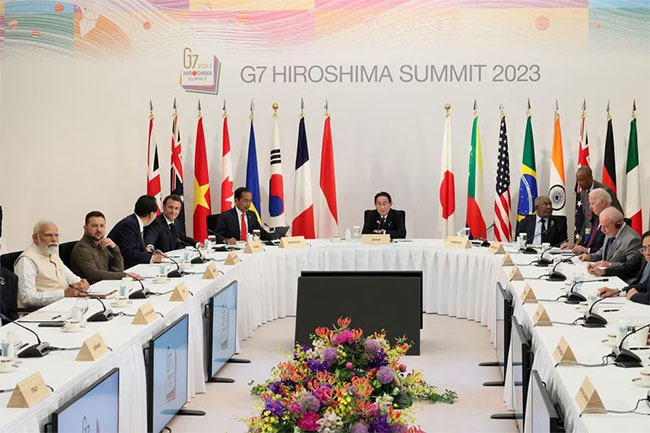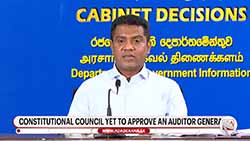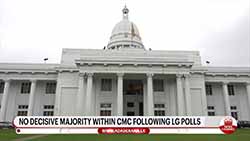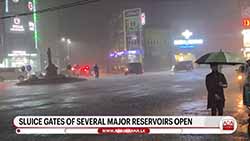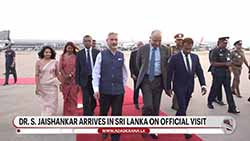Beijing rebukes Japan, Britain over ‘anti-China’ G7 summit
May 22, 2023 03:01 pm
(Reuters) - State-backed Chinese mouthpiece Global Times called the G7 an “anti-China workshop” on Monday, a day after Beijing summoned Japan’s envoy and berated Britain in a fiery response to statements issued at the group’s summit in Hiroshima.
Group of Seven (G7) declarations issued on Saturday singled out China on issues including Taiwan, nuclear arms, economic coercion and human rights abuses, underscoring the wide-ranging tensions between Beijing and the group of rich countries which includes the United States.
“The U.S. is pushing hard to weave an anti-China net in the Western world,” Global Times said in an editorial on Monday titled “G7 has descended into an anti-China workshop”.
“This is not just a matter of brutal interference in China’s internal affairs and smearing China, but also an undisguised urge for confrontation between the camps.”
Beijing’s foreign ministry said it firmly opposed the statement by the G7 - which also includes Japan, Britain, Canada, France, Germany and Italy - and late Sunday said it had summoned Japan’s ambassador to China in a pointed protest to the summit host.
Russia, a close ally of China that was also called out in the G7 statement over its war in Ukraine, said the summit was an “incubator” for anti-Russian and anti-Chinese hysteria.
Separately, China’s embassy in Britain urged London to stop slandering China, after British Prime Minister Rishi Sunak said Beijing represents the world’s greatest challenge to security and prosperity.
The main G7 leaders’ communique mentioned China 20 times, the most in recent years, and up from 14 mentions in 2022.
“China’s reaction this time is quite intense,” said Wang Jiangyu, a professor at City University of Hong Kong.
“The G7 mentioned many concerns (over China) in an unprecedented way. China view these issues as its core interests that are entirely its internal affairs which are not for the G7 to wag their tongues about,” he said.
As well as taking issue with G7 comments on Taiwan, the democratic island China claims as its own, Beijing also accused the U.S. and its allies of double standards over comments about a nuclear build-up and the use of economic leverage.
Despite Beijing’s reaction, U.S. President Joe Biden said he expected a thaw in frosty relations with China “very shortly”.
Some analysts, however, see no sign of any immediate easing of tensions, especially given Beijing’s rapid and sharp rebuttal.
“Beijing’s reaction (especially the early timing of its release) underlines that tensions in the region are already quite high and likely to increase further,” said Moritz Rudolf, research scholar and fellow at Yale University’s Paul Tsai China Center.
JAPAN BACKLASH
China’s decision to summon Japan’s ambassador underlined the intensity of its anger, some analysts said.
Chinese Vice Foreign Minister Sun Weidong summoned the ambassador to register protests over “hype around China-related issues”, the ministry said in a statement.
Sun said Japan collaborated with the other countries at the G7 summit “to smear and attack China, grossly interfering in China’s internal affairs, violating the basic principles of international law and the spirit of the four political documents between China and Japan,” referring to the China-Japan Joint Statement of 1972.
Japan’s ambassador to China, Hideo Tarumi, said it was “natural” for the G7 to refer to issues of common concern as it has done in the past and will continue to do so in the future as long as China does not change its behaviour, according to a readout.
Wang Yiwei, an international relations professor at the Renmin University in Beijing, described China’s overall reaction to the G7 communique as “restrained” but singled out Japan as particularly provocative.
He referred to Japan’s pick for the summit venue Hiroshima, the city flattened by an atomic bomb at the end of World War II, and its push for a joint statement on nuclear disarmament that raised concern about China’s nuclear arsenal.
“The main thing that’s happening here is Japan, using its position as the rotating chair, to create an anti-China movement,” said Wang Yiwei.
Among the G7, Tokyo has also voiced some of the strongest concerns about China’s muscular rhetoric around Taiwan, which sits just off its southern island chain. China has never renounced the use of force to bring Taiwan under its control.
Japan’s Chief Cabinet Secretary Hirokazu Matsuno said on Monday that the country’s policy toward China has been consistent, that it will insist on matters that are needed and urge responsible behaviour, while take steps to address concerns and cooperate on common issues.
Source: Reuters
--Agencies



